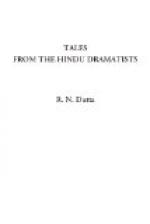The king reflects, “If my queen is so mindful of her duties to her master in the midst of such calamities, I must never forget my duty to my master.”
Then he approaches the queen and addresses her thus:—
“Who are you? You are not allowed to burn the corpse before you give up its clothes to me, the slave of the lord of this place.” She replies,
“Please wait a little. I will take off the clothes.”
As the queen delivers the clothes into the hands of the slave, she notices signs of royalty in his hands and is surprised that such a hand is engaged in so low an office.
“She looks attentively and exclaims in a wild voice, Oh my lord! Oh Maharaja! you a slave in this burning-ground! Oh lord Kausika! are you not yet satisfied?” The queen rushes to embrace the king. The king starts away from her and forbids her saying, “Oh my queen! do not touch me, I am the slave of a Chandal. Be patient.” She faints again.
The king cannot touch her as he is in the garb of a Chandal. After a while, the queen recovers, and the king addresses her thus:—
“Oh my lady! Abandon lamentations. It is useless to lament. All this is the result of work in previous lives. I will prepare a funeral pyre. Apply the sacrament of fire to the dead body and return at once to the house of your master.” The queen is disconsolate and wants to remain with her husband, who explains the situation thus:—“You have no right to remain here. Do not forget that your person has been sold to the Brahmin.”
The queen understands and sighs.
All on a sudden, flowers are showered on their heads from Heaven, and musical voices are heard on high proclaiming.
“Blessed is Maharaja Harischandra; Blessed is Rani Shaibya! unrivalled in this world is the liberality, the patience, the resolution and the wisdom of the king. No nobler man can be found in the three worlds.”
The king and the queen stare motionless towards the Heavens.
Now virtue assumes the form of a hermit and makes this address.
“Victory to Maharaja Harischandra! You have astonished the world, I am virtue incarnate. Virtue is never vain. As you have stuck to me all along, I must reward you. I will send you to the heaven of Brahma, where the greatest kings cannot enter by their truth, charity, straightforwardness and sacrifices. You need not lament any more. Be patient. By my blessing, your son Rohitashya will instantly regain life”. Rohitashya now starts up.




